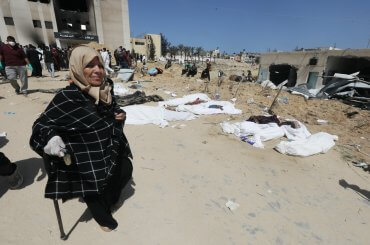As someone who spends a lot of time performing critical analysis of the press as well as studying propaganda in general, there are occasionally stories which prick my interest. A couple of days ago, a story appeared on the IDF Spokesperson’s Website which did just that. The story essentially reports on an interview with one “Mathilde Redmatn”, deputy head of the Red Cross in Gaza. The author quotes Redmatn as saying:
“There is no humanitarian crisis in Gaza,” she explains. “If you go to the supermarket, there are products. There are restaurants and a nice beach. The problem is mainly in maintenance of infrastructure and in access to goods, concrete for example. Israel has the legitimate right to protect the civilan population…”
As one might expect, this “bombshell” was quickly scooped up by the corporate press, and covered (sometimes with extra spin) by CNN, Haaretz, JPost and so on. Now, I’m naturally skeptical of anything that appears in the corporate press or in a government press releases, and this was no exception, although I do have respect for the ICRC.
The story was going to be important in terms of the War of Narratives, so I thought it prudent to check it since it didn’t come in the form of an official ICRC publication. What became immediately apparent is that seemingly no one within the corporate media had bothered to check the veracity of the story. Had they done so, they would have found that there is no one bearing the name “Mathilde Redmatn” in the employ of the ICRC. There is someone called “Mathilde De Riedmatten”, a trivial fact that I was able to glean from speaking with the ICRC in Jerusalem, a fact that not one journalist seemed to care about enough to check.
This is a perfect example of what Herman and Chomsky described as the corporate media’s “symbiotic relationship with powerful sources of information” – the simple, reciprocal understanding that if you provide the information, I’ll print it, without question.
The gloating of the Israeli right surrounding this story is an indication of just how far their moral compass is out of alignment. That one person at a respected human rights organisation, in an unofficial document stating that “there is no humanitarian crisis in Gaza,” can be a source of unbridled joy is certainly perplexing. We already knew from the Palestine Papers that:
“As part of their overall embargo plan against Gaza, Israeli officials have confirmed to (U.S. embassy economic officers) on multiple occasions that they intend to keep the Gazan economy on the brink of collapse without quite pushing it over the edge,” whilst keeping the Gazan economy “functioning at the lowest level possible consistent with avoiding a humanitarian crisis”.
A noble strategy indeed.
From the Palestinian perspective, the term “humanitarian crisis” is to be used by the corporate media, propagandists and humanitarian organisations. It in no way, shape or form alters the reality on the ground. What might amount to normalcy in Gaza would undoubtedly be viewed as a crisis in say the US for example. So, whilst it is of little value to debate the existence or non-existence of a “humanitarian crisis”, it is useful to remind ourselves of the facts.
- We know from the UN’s March update that a majority of Gazans are food insecure and rely on aid.
- We know that Gaza’s fishermen are limited to fishing within 3 miles of the shore, in a stretch of water heavily contaminated with raw sewage. (Incidentally this raw sewage also contaminates Gazas “nice beach”)
- We know that 35% of agricultural land is off limits to farmers, unless they wish to find death at the hands of the IDF, and this doesn’t take into account agricultural land rendered inoperable as a result of the Gaza Massacre.
- We know that 90% of drinking water extracted from the aquifer is brackish and fail’s to meet the WHO’s standard for drinking water.
In the drive to reduce the plight of the people of Gaza down to a sound bite, the details get lost, the facts become noise. Let’s not make that mistake. Let’s look at the documentary record and let’s expose the corporate media for what they are – the faithful servants of established power. I have asked the ICRC in Jerusalem for clarification on this issue, and await their reply.

